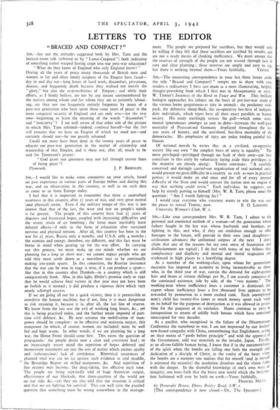SIR,—I would like to make some comments on your article,
based on past experience in various parts of Europe before and during this war, and on observation in this country, as well as on such data as come to us from Europe today.
I feel that it is important to remember that there is undoubted weariness in this country, after 21 years of war, and very great mental (and physical) strain. Even if the military tempo of this war is less intense than that of the last, the wear and tear on people's minds is far greater. The people of this country have had 21 years of disasters and frustrated hopes, coupled with increasing difficulties and the severe strain of air bornbing ; the latter must inevitably leave delayed effects—if only in the form of relaxation after sustained nervous and physical tension. After all, this country has been in the war for 24 years, Russia only 9 months, and U.S.A. only 4 months ; the stamina and energy, therefore, are different, and this fact must be borne in mind when gearing up for the war effort. In carrying out this process, we must make up our minds whether we are planning for a long or short war: we cannot expect people who are told they must settle down to a marathon race to be continually making too-yards spurts. In this connexion, the Russian insistence that the war can be won in 1942 is wise, if it can produce a spurt— like that in this country after Dunkirk—in a country which is still comparatively fresh. Also, in this light, Hitler's promise early in 1941 that he would achieve final victory in that year may not have been so foolish as it seemed ; it did produce a vigorous drive which very nearly achieved success.
If we are going all out for a quick victory, then it is permissible to overdrive the human machine, but if not, then it is most dangerous to risk straining it, because it is, after all, the last line of reserve. We know from the last war the evil of working long hours, &c., yet this is being practised today, and the further strain imposed of part- time civil defence, &c. By next autumn the mobilisation of man- power should be complete: to be effective and maintain output, this manpower (in which, of course, women are included) must be well fed and kept warm. In other words, if we are planning for a long war, the Home Front should come first. This raises the question of propaganda : the people desire now a clear and consistent lead ; to an increasingly weary mind the repetition of hopes deferred and inconsistent statements are just the sort of matter which creates apathy and (subconscious) lack of confidence. Rhetorical assurances of planned total war cut no ice against such evidence as coal muddle, the Beveridge Report on skilled manpower, &c. And repetition of fine oratory may become, like drug-taking, less effective each time. The people are being repeatedly told of huge American output, effectiveness of our blockade, that three-quarters of the world are on our side, &c.—yet they are also told that the situation is critical and that we are fighting for survival. This can well raise the puzzled question that something must be wrong somewhere in the manage-
ment. The people are prepared for sacrifices, but they would only be willing if they felt that these sacrifices are justified by results, and are not a ready means of cloaking inefficiency. We must ensure that the reserves of strength of the people are not wasted through lack of care and clean planning ; these reserves are ample and easy to tap,
but there is nothing beyond them.—Yours faithfully, VIATOR.


























 Previous page
Previous page